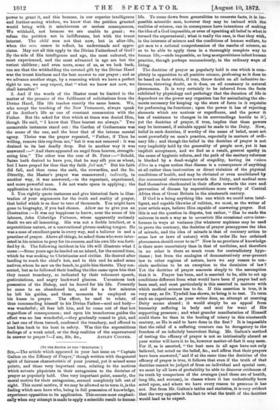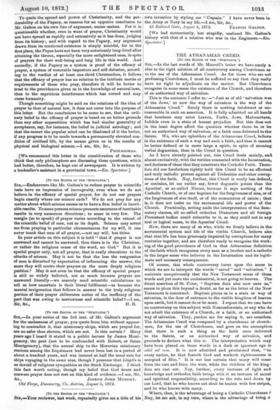[TO THE EDITOR OF THE "SPECTATOR. " ] Sin,—The article which appeared
in your last issue on " Captain Galton on the Efficacy of Prayer," though written with thegeneral spirit of fairness characteristic of your journal, yet it missed some points, and those very important ones, relating to the motives which actuate physicists in their antagonism to the doctrine of prayer as popularly held. One very important point, namely, the moral motive for their antagonism, seemed completely left out of sight. This moral motive, if we may be allowed so to term it, is the feeling which men have who, being in full possession of knowledge, experience opposition to its application. This occurs most emphati- cally when any attempt is made to apply a scientific result to human
life. To come down from generalities to concrete facts, it is im- possible scientific men, however they may be imbued with the realities of science, can in consequence have intentions of making the idea of a God impossible, or even of upsetting all belief in what is termed the supernatural; what is really the case, is that they wish, in the interests of science and the conditions of human welfare, to get men to a rational comprehension of the results of science, so as to be able to apply them in a thoroughly complete way to human life,—ends impossible, so long as superstitions infect human, practice, though perhaps unconsciously, in the ordinary ways of living.
The doctrine of prayer as popularly held is one which is com- pletely in opposition to all positive soiencer professing as it does to be based on facts which, if true, throw doubt on all inductive in- ference, throwing doubt, as it does, on all constancy in natural, phenomena. It is very certainly to be inferred from the facts exhibited by physiology and pathology that the duration of life is dependent on the power any organism has for assimilating the ele- ments necessary for keeping up the store of force in it requisite, for performing its functions ; upon the power it has of rejecting elements which are noxious or superfluous, and the power it has of resistance to changes in its surroundings hostile to it T yet the doctrine of prayer, if true, implies that these powers may be increased, if suitable appeal be made to the Deity. Now, belief in such doctrine, if worthy of the name of belief, must act most powerfully on men's practice, especially in matters of ordi- nary life ; and though the belief in the doctrine of prayer is not very implicitly held by the generality of people now, yet it has implicit acceptance, and we find as a result, general apathy in. the cause of hygienic reform, and the path of the sanitary reformer is blocked by a dead-weight of stupidity, having its raison d'être in a vague notion that disease is a consequence of anything at all rather than inattention or direct violation of the physical. conditions of health, and may be obviated or even annihilated by due ceremonial observances towards the Deity, and medical men, find themselves checkmated in their efforts towards the cure and prevention of disease by superstitions more worthy of Central. Africa than of Great Britain in the nineteenth century.
If God is a being anything like one which we could term intel ligent, and capable likewise of volition, we must, as the writer of your article says, believe Him capable of answering prayer. But this is not the question in dispute, but rather, " Has he made the universe in such a way as to necessitate His occasional extra-inter- ference in ways at variance (for whatever sophisms may be used to prove the contrary, the doctrine of prayer presupposes the idea of miracle, and the idea of miracle is that of contrary action to. some law or laws of nature) with the order He has ordained, phenomena should occur to us?" Now in no province of knowledge. is there more uncertainty than in that of medicine, and therefore in no other is there so much room for contradictory hypo- theses ; but from the analogies of demonstratively ever-present law in other regions of nature, have we any reason to con- clude medicine to be an exception to the dominion of law? Yet the doctrine of prayer amounts simply to the, assumption that it is. Prayer has been, and is asserted to be, able to set up conditions different from what would have been if prayer had not been used, and most particularly is this asserted in matters with. which medical science has to do. If this assertion is true, it is very easy, as Dr. Tyndall has shown, to bring it to test. To term, such an experiment, as your writer does, an attempt at coercing Deity seems absurd ; it would simply be an appeal from humanity suffering in body and soul for want of His supporting presence ; and what grander manifestation of Himself could there be than in the healing of misery in this nineteenth century, as He is said to have done in the first? It is impossible that the relief of a suffering creature can be derogatory to the freedom of an infinitely benevolent Being. Mr. Galton's method of testing the efficacy of prayer is not so intrinsically absurd as your writer will have it to be, however matter-of-fact it may seem. For if, as is asserted, " the best men in all ages have not only believed, but acted on the belief, &c., and affirm that their prayers have been answered," and if at the same time the doctrine of the efficacy of prayer is true, it follows that even if the truth of that doctrine cannot be judged of from an individual and special case, we must by all laws of probability be able to discover evidences of its truth by comparison of the averages (and these are of health, long life, and success), in classes where it has undoubtedly been acted upon, and where we have every reason to presume it has not. But from Mr. Galton's tables and statistics, it is very evident that the very opposite is the fact to what the truth of the doctrine would lead us to expect.
To quote the spread and power of Christianity, and the per- durability of the Papacy, as reasons for an opposite conclusion to Mr. Galton on his own line of argument, seems useless. For it is questionable whether, even in want of prayer, Christianity would not have spread as rapidly and extensively as it has done, judging from its history ; and with regard to the Papacy, any argument drawn from its continued existence is simply suicidal, for in the first place, the Popes have not been very notoriously long-lived after attaining the throne, especially the more enlightened ones, in spite of prayers for their well-being and long life in this world. And secondly, if the Papacy as a system is proof of the efficacy of prayer, a system of venerable imposture and self-delusion, accord- ing to the verdict of at least one-third Christendom, it follows that the efficacy of prayer has no relation to the intrinsic merits or requirements of those who pray, therefore it will be better to trust to the providences given us in the knowledge of natural laws, than to the capricious interference which has cursed and may curse humanity.
Though something might be said on the relations of the idea of prayer to that of natural law, it does not enter into the purpose of this letter. But the conclusions to be come to are, that the ordi- nary belief in the efficacy of prayer is based on no better grounds than any other superstition which has had similar generality of acceptance, say, for instance, the belief in judicial astrology ; and that the sooner the popular mind can be disabused of it the better, if any progress is to be made towards a permanently elevated con- dition of civilised life, by the means given us in the results of physical and biological science.-1 am, Sir, &c.,
PROTAGORAS.
[We recommend this letter to the consideration of those who think that only philosophers are discussing these questions, which had better, therefore, be kept out of newspapers. It is written by a bookseller's assistant in a provincial town.—En. Spectator.]

































 Previous page
Previous page